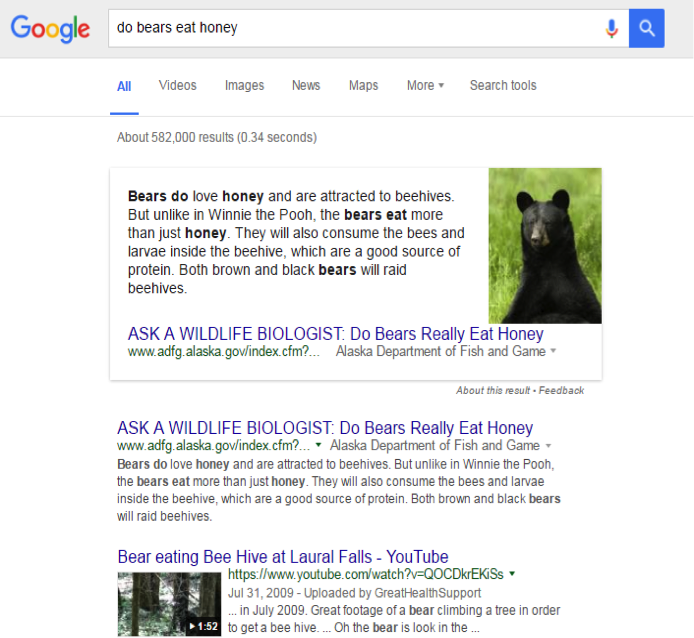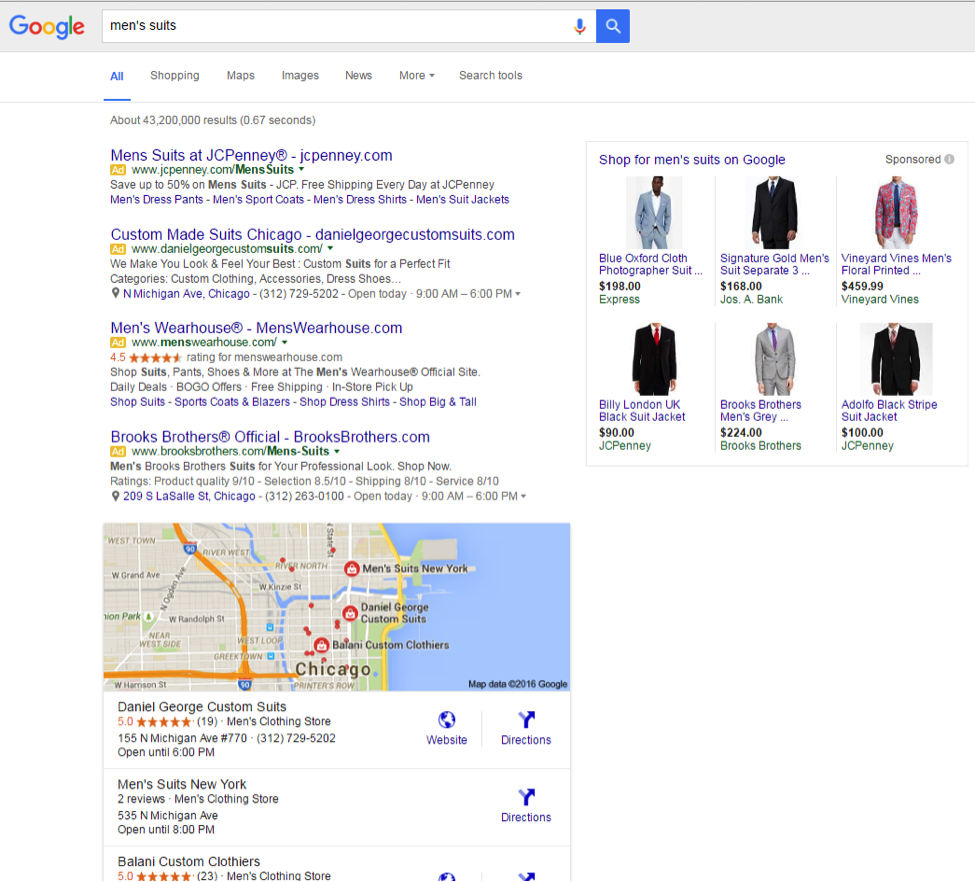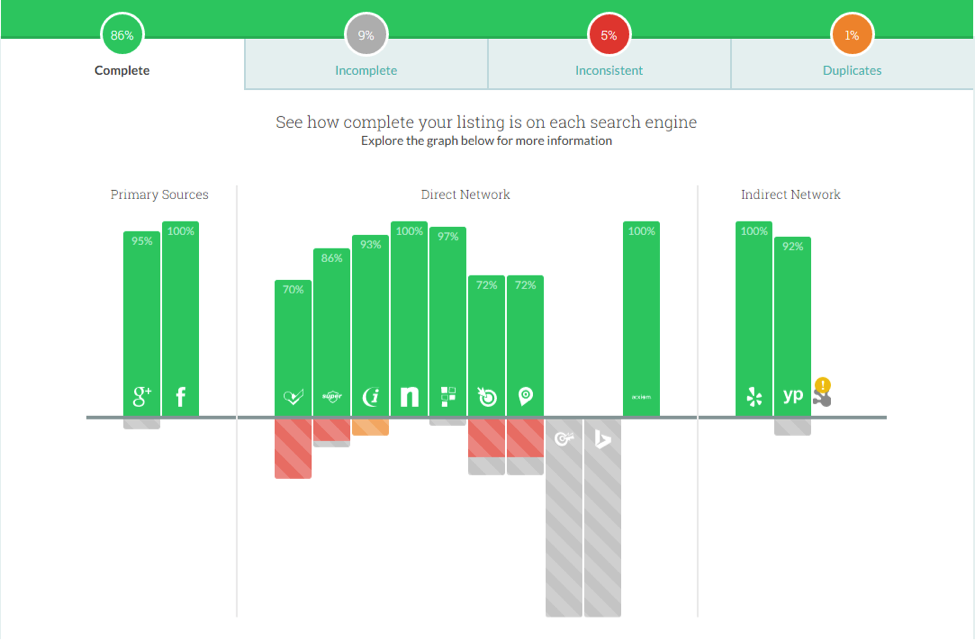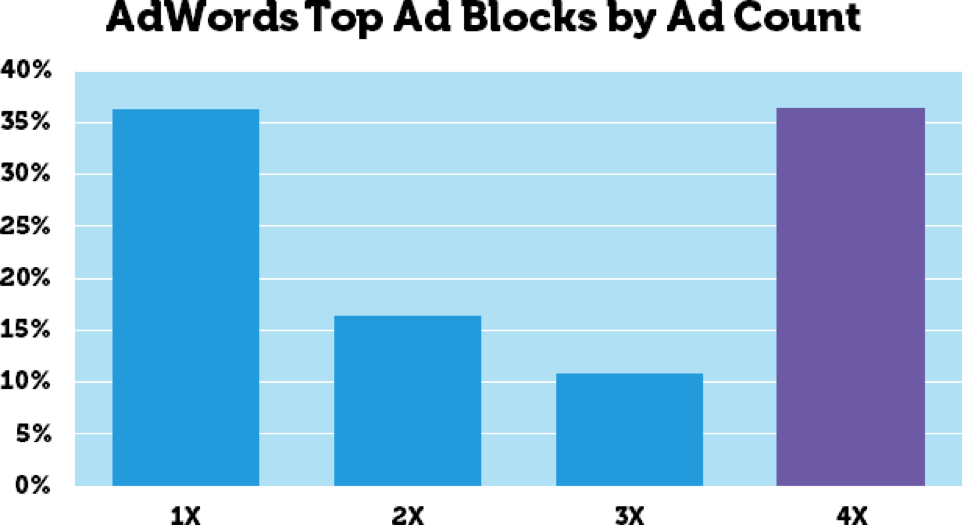The appearance of Google’s SERP (search engine results page) periodically shifts as they experiment with new ways to display paid and organic search results to customers.
The latest iteration removes the paid text ads in the right hand column (on desktop results only), but extends the paid results in organic search results. Now, up to four ads are shown above organic results.

As Larry Kim has pointed out, Google is a zero-sum game someone has to win and someone has to lose. According to Kim’s data, PPC will be the winner in this case, while organic search will be the loser. He cites these reasons:
- Paid search results now look more like organic results
- The number four paid ad has taken the spot that was occupied by the number one organic result
- The number of pages returning four ads is growing, and these pages push organic results below the fold
So, we adjust. SEO is about problem solving. It’s ever evolving, trying to stay in step with Google. You’ve worked through algorithm changes in the past. This is just one more egg to fry.
Here are four ways you can adjust your site SEO strategy to account for the new face of SERPs.
1) Start aiming for the answer box
Stay in the SERP spotlight by getting your website selected to be featured in the answer box. The answer box still falls below paid results (if there are any), but it is prominently called out.

With the proliferation of voice search, including the introduction of Gboard to phone conversations, you should already be shifting your web copy toward more natural language.
As Andy Crestodina notes, voice-based queries tend to be longer phrases and tend to be questions. Therefore, you should be shifting your content into a question and answer format to meet searcher’s queries.
As an added benefit, writing for natural search can increase your chances of making it into the coveted answer box.
James Perrott makes his criteria for hitting the answer box a little more specific – check out his tips here: Google Answer Boxes: how and why.
2) Make local optimization a priority
If you have brick and mortar business locations, getting in that local pack is more important than ever. Otherwise, organic search space on page one of this SERP is virtually non-existent after four paid results and the local pack.
Let’s take a look at men’s suits.

Follow these recommendations to ensure that your site makes it into the local pack.
- Make sure your NAP (business name, address, phone number) is in readable text on your website on multiple pages or in your header.
- Add local business schema markups to your code.
- Start a Google My Business page for your business (if you don’t already have one).
- Start racking up reviews. Reviews can help your presence in the local pack. Think of non-obtrusive ways you can gently ask your customers to leave a review if they enjoy your products and services.
- Make sure your business is listed in all of the local directories. MOZ local is a great tool for this is. As you can see in the image below, MOZ Local lets you check out your business listings in all of the important online directories to see where your listing is complete and where it needs work.

3) Stop writing for keywords, start writing for topics
Hopefully, you aren’t still targeting one specific keyword with your content. Keywords aren’t dead by any means, but it’s always a better idea now to write pieces that target topics, using a variety of semantically linked keywords.
First of all, search engines are advanced enough at this point to build a bigger picture of your webpage without you ramming a specific keyword down their throats over and over.
Secondly, however, building a strong semantically optimized article around a topic potentially helps the article rank highly in SERPs for multiple different queries. This greatly increases your odds of landing in SERPs that feature one or no paid search results at the top of the page.
As of February 23, MOZ noted that 36.4% of top ad blocks on SERPs contained four ads. The same amount of pages only had one ad. And those are only counting the pages that have any ads at all.

Yes, there are still ad-free SERPs – for example, I just ran a search for “auto repair” and there were no ads in my SERP.
4) Form a closer alignment with paid search
Paid and organic search teams need to coordinate to maximize brand exposure in search. As noted recently by Thomas Stern, a mutually-beneficial relationship between the two will allow paid search to boost visibility while organic search identifies gaps in the competitive landscape.
Your paid search counterparts should be focused on placement in queries that are dominated by four-packs of paid results, where your organic efforts are going to lose significant amounts of clicks.
Meanwhile, you are free to focus more of your organic search efforts optimizing around topics that have more ad-free breathing room in SERPs, and that competitors have neglected to target.
Your paid search team is not your adversary. Coordinate efforts to dominate SERPs and pull in more visits.
The nimble will win
A big part of success in SEO is being nimble and adaptable. Rather than worrying about what small changes Google might make next, you will be better served looking at the broader themes that are developing and preparing for them:
- Start writing for natural language and improve your chances of getting featured in the answer box
- Make an extra effort to ensure that your site is optimized for local search (if possible)
- Hit more SERPs by writing for topics instead of keywords
While we are losing the organic SERP space, this is a good opportunity to reevaluate your approach to search optimization and be better positioned for whatever big changes are coming next.
Ryan Johnson is the SEO Manager at DigitasLBi and a contibutor for SEW. You connect with Ryan on Twitter.




